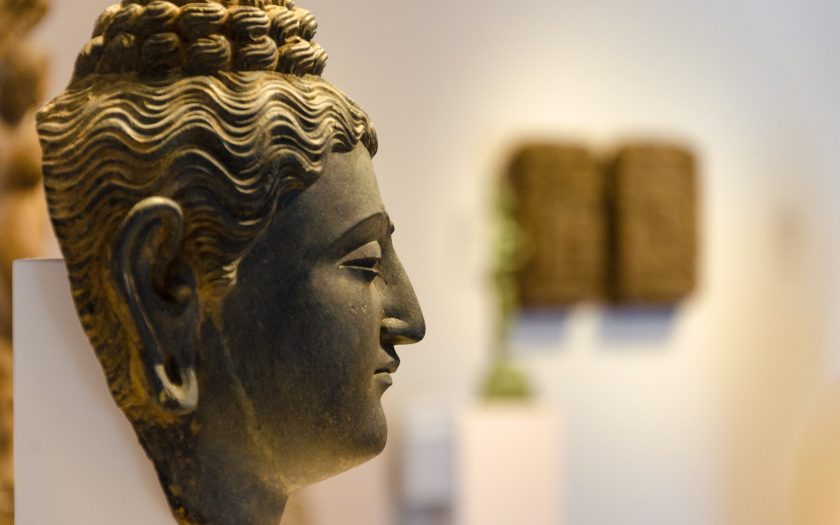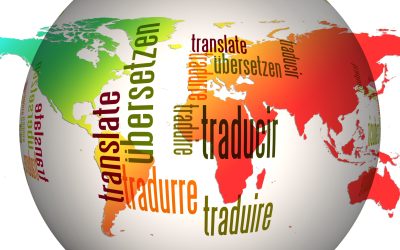The Bible is full of instructions from the Lord God on how we humans may serve Him. That "may" is not an option out of many, not an option we can also ignore. But neither is it a must in the sense of duty or compulsion. We humans can make choices, which is why it is special that the Bible also constantly shows how we may not approach God. Again, in Deuteronomy 4, these things are contrasted and they are meaningful for the believing Christian of 2024 as well.
- A little background
- Leaving out or adding nothing
- Baal-Peor and the gods
- It is deception: no spirit dwells in it
- A few encounters with 'That which is bigger than ourselves'
- In the 21st century, what do we still have with images?
- We cannot feel the Lord God
- The Lord gives us His words
- The Lord God is near: believe it
- Blessed who seek the Lord
A little background
Deuteronomy is the last book of Moses. You could say it is his last words to the people of Israel; a kind of farewell letter. Moses led the people out of Egypt and preceded them through the desert for forty years. Before they will cross the Jordan River and enter the Promised Land, Moses gives them this book, as it were. it is the book of Moses that warns most against idolatry.
In the first chapters, Moses gives a very brief account of the events of the people after the exodus from Egypt. He recounts how they refused to enter the promised land (Deuteronomy 1:26). This was "not just" disobedience or unbelief but a result of the idolatrous practices they brought with them from Egypt (cf. here). If you read the first chapter, it shows that they were afraid of the giants that were in the land and did not trust the Lord.
In the second and third chapters, you read that after forty years they went up to the land again and then had to pass through the territories of the kings Sihon and Og. There - east of the Jordan River - lived giants similar to those the spies had seen 40 years earlier in the Promised Land.
Next we get chapters 4 and 5 and from them we want to try to learn what this has to say to the people of God - then, but also now. It is good to read these portions just once (or a few times) in their entirety. We want to walk through them here and consider what these portions tell us about "serving God" and "serving the gods.
Leaving out or adding nothing
Chapter 4 begins that these words are meant for God's people "that you may live" and that they might receive the blessings God has for them. Then it is immediately added in the second verse that they need the whole Word of God and that they were to "add nothing to it nor subtract anything from it." Further on in Deuteronomy, the same expression occurs: "All this I command you, you must observe closely. You must neither add to it nor subtract from it." (Deuteronomy 12:32). This whole section from 4:2 through chapter 12 is sandwiched between this phrase and is about how God wants to be served and that He does not want them to "serve the gods. These two things are repeated over and over again in this section.
It may be an additional call to understand what these terms mean. Because this is what happens: when I have no idea what "serving the gods" means, I quickly read on. But then I neglect the Word of God and in fact I then do away with that Word.
Or in other words, the beautiful things in the Bible are wonderful and the Gospel is fantastic, but there are also very difficult things in the Bible and we are all too quick to skip them.
In the last verses of the Bible, at the end of the book of Revelation, a similar expression occurs: "For I testify to everyone who hears the words of the prophecy of this book: If anyone adds anything to these things, God will add to him the plagues written in this book. And if anyone subtracts from the words of the book of this prophecy, God will subtract his portion from the book of life, and from the holy city, from the things written in this book." (Revelation 22:18-19).
Baal-Peor and the gods
Immediately following the warning in verse two is a reminder of what they "saw with their own eyes" of what the Lord did at Sittim (Numbers 25:1-9). There the people bowed down before the god Baal-Peor1 and the result was that the Lord had to judge and twenty-four thousand men were killed. It was the terrible consequence of their idolatry that they perished and a tremendous warning to all the people.
As 21st-century Western Christians, we can't imagine much about past divinities. Therefore, it is good to remember that images have always been used in pagan religions. An image was believed to be the (temporary) home of a deity, and this "belief" has been widespread throughout history in different cultures and religions to this day. It is known as animism of fetishism and can explain why images (as well as objects) play an important role in all religious traditions.
Click here if you want to learn more about what animism or fetishism is.
Animism
Animism is the belief that objects, places and beings have a spiritual essence or soul have. This idea is often present in traditional religions, especially among indigenous peoples, where natural elements such as trees, mountains, rivers and also man-made objects (such as statues) are considered animated. An image is then seen as a dwelling for the spirit or deity it represents, and by paying homage to that image, you honor the spirit or god itself.
The Fetishism
Fetishism is a related concept in which it is believed that specific objects, such as statues, magical or supernatural forces have. These objects could contain divine powers that offer protection or grant wishes. This idea was (and is) present in several African and Oceanic religions.
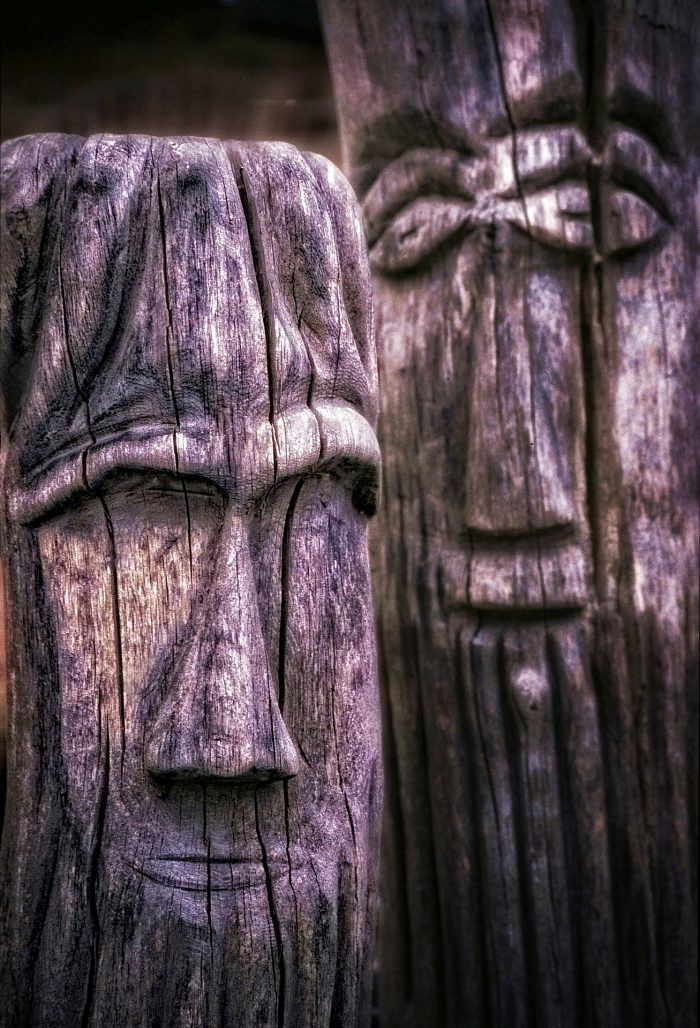

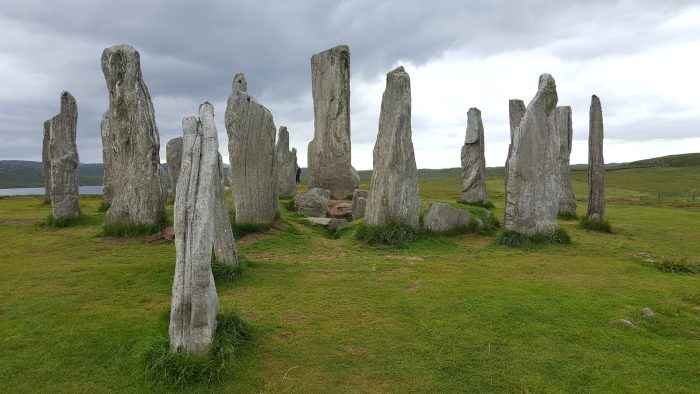
When you wanted or wanted to hear something from the deity for whatever reason, there were rituals to support that so that the god heard you and you got an answer to your question or desire.
But then we Westerners say it is superstition, because there is no god in a statue, so what are you doing anyway? It is pure nonsense and self-deception, isn't it?
It is deception: no spirit dwells in it
That there is no god in an image is a statement confirmed by the Bible, for we find the same thought in Jeremiah 10:14 and 51:17). In the EBV2-translation read the following:
"(...) for his cast image is deceit and no spirit dwells in it."
Jeremiah 10:14 and 51:17
The Bible makes two things clear in this text.
- an image is not animate, has no breath and is not the dwelling place of a spirit. An image is dead matter (see, for example, Jeremiah 10:3-5).
- That you yet you experience something special, something that presents itself to you as god, is deception!
When people bow down before an image and perform rituals or offer sacrifices, they experience the deity. This is actually bizarre because you seek an invisible living being (God or a god), turn to dead matter and then you experience that which you seek: God or the god.
Wanting to experience God is the way
To 'divine experiences' of demons
The gods of the nations are approached that way, and they - the demons - are ready to give people unforgettable experiences. That is why the Lord forbids His people to approach Him in a pagan way. Because in reality you then come into contact with the demons3 And you are deceived by them.
That demons do this deceptive deception to people is no wonder, for they are cut from the same cloth as the devil who is "the liar and the father of lies" (John 8:44). If Satan, who is also called the "prince of darkness," pretends to be an "angel of light" (2 Corinthians 11:14), then it is not surprising that demons deceive people in similar ways.
A few encounters with "That which is greater than ourselves
When we consider this then we can also make sense of what happened at Sinai when the people of Israel worshiped the golden calf. It reads like this:
"Then all the people tore off the gold rings they had in their ears, and they brought them to Aaron. He took them from them, he carved them with an engraving pen and made them into a cast calf. Then they said: These are your gods, Israel, who led you out of the land of Egypt.
When Aaron saw this, he built an altar for it, and Aaron announced: Tomorrow there will be a feast to the LORD! They rose early the next day, brought burnt offerings and also brought thanksgiving offerings. The people then sat down to eat and drink; then they rose to celebrate lavishly.
Then spake the LORD unto Moses, Go, descend: for thy people, whom thou hast led out of the land of Egypt, have acted perniciously. They have quickly departed from the way which I had commanded them: they have made for themselves a cast calf, they bow down before it, sacrifice to it, and say, These are your gods, Israel, who have led you out of the land of Egypt. (Exodus 32:3-8)
Aaron believed that they would celebrate a feast to the Lord, when in reality the people were engaged in idolatry. What they inwardly experienced and felt was what they called "your God.4. Thus they have been horribly misled.
Another special case is the copper serpent, a symbol of God's grace.
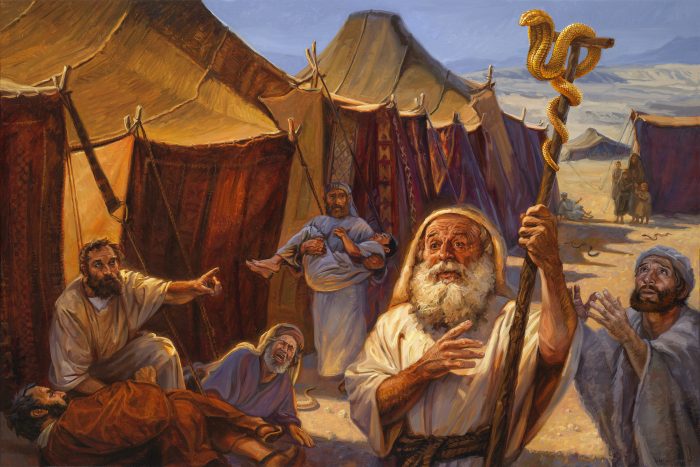
"And the LORD said to Moses, Make you a poisonous snake and put it on a stake. It will happen that every one who is bitten will remain alive if he looks at that. Then Moses made a copper serpent and put it on the stake. And it happened when the serpent bit someone that he looked at the copper serpent and remained alive." (Numbers 21:8-9)
For the people brought the serpent with them into the promised land, and apparently at some point it began to be used as an image for worship. King Hezekiah, who removed from the land the sacrificial heights where idolatry was committed, also destroyed this copper serpent.
"Hezekiah took away the sacrificial heights, smashed the consecrated stones and cut down the consecrated poles. He also crushed the brazen serpent, which Moses had made, because until that time the Israelites had offered incense to it; it was called Nehustan."(2 Kings 18:4)
The brass serpent that Moses was commissioned by the Lord to make, which brought healing when people looked at it, became, by the way, an object of worship. It became, so to speak, "an image in which there was a spirit. See also here.
In the 21st century, what do we still have with images?
Just a quick note in between.
We might think that we, Christian people of the 21st century, have nothing to do with images. Yet this is not true, because to begin with, a large part of Christendom does have something - or perhaps a lot - with images. Just think of the Roman Catholic Church or Eastern churches, where you cannot enter a church building without encountering images. Images of Christ, the crucifix, but also the images of all kinds of saints. In the Roman Catholic Catechism5 the second commandment is omitted and the tenth is split in two, so you still get ten commandments again.
But moreover, we must generalize this for our time. The principle is that God's people - Israel then, but also the Christian today - must not approach God in the ways that unbelievers approach their gods (cf. here). Many more ways have developed over time by which people turn to the invisible world. As examples, just think of "silence," meditation in all forms, Lectio Divina, "prophesying," praying the "Jesus Prayer," a rosary chant, walking a labyrinth, and so on. The list is endless.
The bottom line is that we may approach the Lord God in faith only in the Bible, His Word. Anything that goes beyond that and is intended to make us experience something special from God, we must strongly reject. Also read here about the crafty temptations.
"For he who comes to God must believe that He is, and that He rewards those who seek Him."
Hebrews 11:6
Let us not delude ourselves that there would be "more"!
We cannot feel the Lord God
But our God is different and higher than all the gods. He is the creator of heaven and earth, the supreme God, and He cannot be approached like the gods. He connects with His people in completely different ways. When He communicates with His people He does so with words that can be understood. So it is in the chapter - Deuteronomy 4 - with which we began:
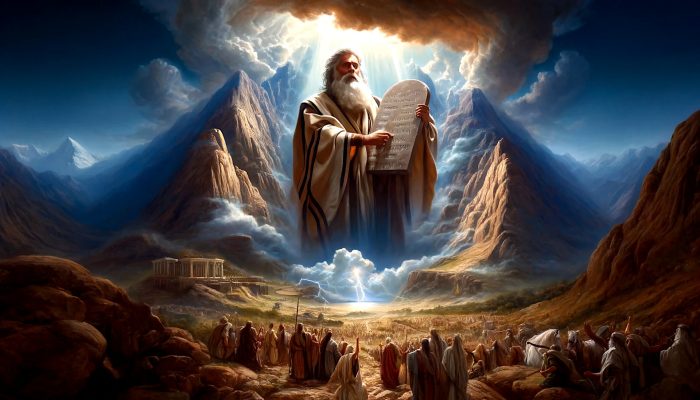
"You may neither add to nor subtract from the word which I command you, that you may observe the commandments of the LORD your God which I command you. (...) Behold, I have given you the regulations and provisions learned, as the LORD my God commanded me; to act thus in the midst of the land into which you shall come to take possession. (...) On the day that you stood before the LORD your God at Horeb, the LORD said to me, Call the people together before Me, and I will make them hear My words, which they are to learn, to fear Me, all the days that they shall live on the face of the earth, and which they are also to teach their children. (...) And the LORD spoke to you from the midst of the fire; the sound of the words you heard, but a figure you did not see, there was only a voice. 13 He made known to you His covenant, which He commanded you to do, the Ten Words, and He wrote them on two stone tablets. 14 And I commanded the LORD in those days to teach you ordinances and provisions, to do them in the land to which you go to take possession of it. 15 You must, for the sake of your life, be very wary - for you did not see any figure on the day that the LORD spoke to you at Horeb from the midst of the fire ..." (Deuteronomy 4:2,5,10,12-15)
Actually, you should read through the whole chapter. It was a terrifying situation there at Mount Horeb. A mountain that burned with fire, to the very heart of heaven, darkness, clouds and darkness. Although the sound that could be heard in the process had to do with the words God spoke, they did not see His stature. They perceived something terrible from the Lord without understanding it. To put it this way, what they could perceive of the Lord is not exactly something that would make you feel good. Nor does it invite you to try again ...
The message the Lord was giving with that was that you as a human being should not try to get closer to Him. Then you would suffer the terrible consequences.
Yet at the mountain, the Lord also made it known how He wants to be served.
The Lord gives us His words
He gave His words: the 10 words He Himself wrote on the clay tablets and the ordinances and provisions He gave to Moses. In Exodus, it is written from the tablets:
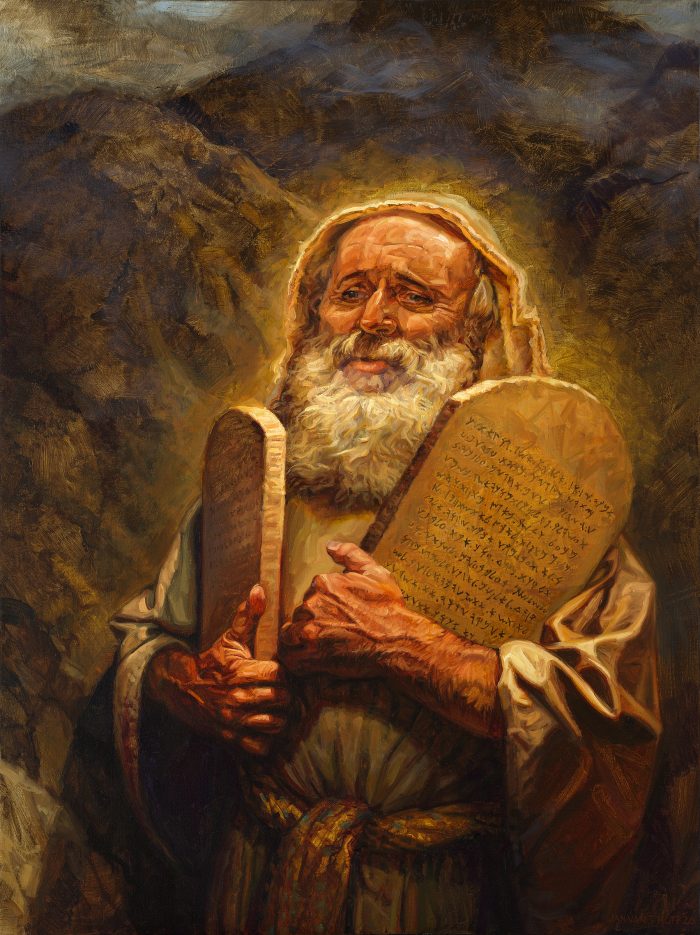
And when the LORD had finished speaking to him on Mount Sinai, He gave Moses the two tablets of the testimony, tablets of stone,
described with the finger of God.
(…)
Those tables were God's own work;
Also, the writing was God's own writing,
engraved in the tablets."
(Exodus 31:18; 32:16)
It is impressive how it is described here: the finger of God, God's work and God's own writing. Could He say it more clearly that every word He has written comes from Him? That they are His thoughts and His own words? And would that only apply to the Ten Commandments?
I am convinced that it applies to the entire Bible, that is, including everything Moses, the prophets and the apostles wrote. It is unmistakably God's own Word, His own work6.
By the way, the expression 'finger of God' occurs four times in the Bible. Twice it is contrasted with the work and powerlessness of demons (Exodus 8:19; Luke 11:20). The other two times concerns the writing on the stone tablets (in Exodus 31:18 and Deuteronomy 9:10), indicating that the Bible wants to inform us that the Bible was truly written by God and cannot be the work of demons.
Satan and his powers are unable to give a book like the Bible to people. It is written by the finger of God, His own work!
Therefore, they were words they could understand. That was the way the Lord made Himself known to His people: through His words they could get to know Him and understand what He liked.
Of course, this is completely different from how the gods connect with humans: by giving them wonderful experiences too great for words.
God, the Creator of all things, communicates with His people in words they can understand. But there is something very special about this.
The Lord God is near: believe it
God not only gave His words, but He also promised them that He would be close to them. We read that in the same chapter Deuteronomy 4, and it is worth reading that chapter again carefully.
"For what great nation is there where the gods are so near as the LORD our God is with us, always when we cry to him?"
Deuteronomy 4:7
The Lord gave two things: His words and His nearness; but with them the warning not to serve the gods of the nations. If you believed the Word of the Lord, you did not have to go to an image and perform some ritual, then wait for the deity to come to you. No, if you believed Who the Lord was and trusted what He had said, then you were allowed to go directly to Him and call upon Him. He was right there with you!
We easily say it that our God is omnipresent. But that is still fairly general and impersonal, although it is actually incomprehensible to us. But when God says to His people that He is near, it does take on something very personal and secure.
That the Lord is near is something we know because He said so. It is not something we could feel. It is God's promise that we trust and therefore we know that He is near. We don't need images and rituals or some "holy object" for that7.
Later, Paul writes to the Romans, "Close to you is the Word, in your mouth and in your heart." (Romans 10:8). In that section, he quotes Moses and then writes further as follows:
"This is the Word of faith, which we preach: If you confess with your mouth the Lord Jesus and believe with your heart that God raised Him from the dead, you will be saved. For with the heart one believes unto righteousness, and with the mouth confesses unto salvation. For Scripture says, Everyone who believes in Him shall not be ashamed. For there is no distinction between Jew and Greek. For One and the same is Lord of all, and He is rich to all who call upon Him. For everyone who will call on the Name of the Lord will be saved." (Romans 10:8-13)
To believe that our God is near, that His Word is near, and in that faith to seek communion with the Lord God and His Word is a task for every believer. A task we do not do because we have to, but because we love Him (e.g. Deuteronomy 10:12 and 1 John 4:19).
Blessed who seek the Lord
A wonderful example gives us the poet of Psalm 119. It is worth reading that Psalm again in its entirety. It is extraordinary how the anonymous psalm poet testifies to a life with the Lord and His Word. Those two things are constantly intertwined - one might also say they coincide - and belong inseparably together.
Below is a small and random selection
“Welzalig wie Zijn getuigenissen in acht nemen,
who seek Him with all their heart,"
(…)
“Ik zoek U met heel mijn hart,
Let me not stray from Your commandments.
I have stored Your promise in my heart,
That I may not sin against You.
Praised be Thee, LORD,
teach me Thy ordinances."
(…)
“Ontsluit mijn ogen en laat mij aanschouwen
The wonders of Your law.
I am a stranger on the earth,
Do not hide Your commandments from me.
My soul is consumed with desire
according to Your provisions, at all times."
Psalm 119:2, 10-12,18-20 -.
Footnotes
- Baal-Peor means "Lord of Peor. Peor means something like "chasm. Possibly this refers to the deity, which you cannot simply reach; a dividing chasm must be bridged. Images and rituals are needed. ↩︎
- The Hebrew word is 'ruach' which occurs over 300 times in the Old Testament and is also often translated as 'spirit' or 'Spirit'. The HSV translation here has he word "breath. ↩︎
- The (off)divination is always associated with dealing with demons. In the following places the gods are literally called demons: Leviticus 17:7, Deuteronomy 32:17; 2 Chronicles 11:15; Psalm 106:37. ↩︎
- Or "your gods. ↩︎
- The RC Catechism is a simplified doctrine of faith, so that ordinary people could understand the Bible to some extent. ↩︎
- See also 2 Timothy 3:16 - "All Scripture is inspired by God and is useful for teaching by it ..." ↩︎
- In this connection the following. It is quite conceivable that this is also the reason why only Aaron and his sons were allowed to do the work on and in the tabernacle. Other Israelites were not even allowed to come close to the tabernacle and its objects so that they would not be tempted to approach the Lord in a pagan manner. If anyone came too close, such a person was to be put to death (e.g. Numbers 1:51; 3:10,38). When Uzza touched the ark of the covenant that threatened to fall, he had to pay for it with death (2 Samuel 6:7). ↩︎
